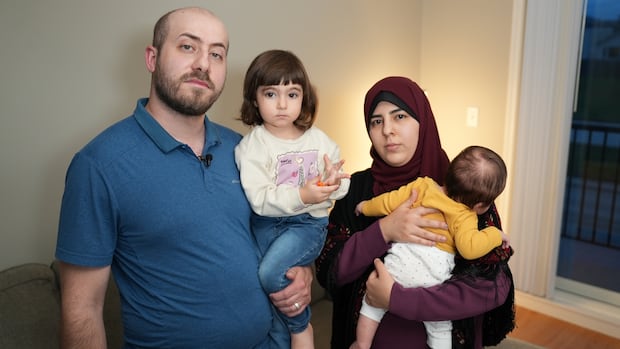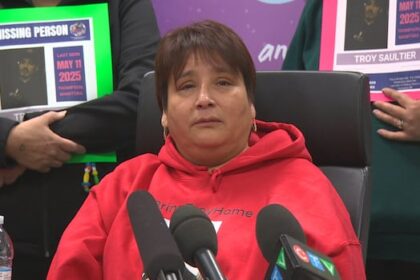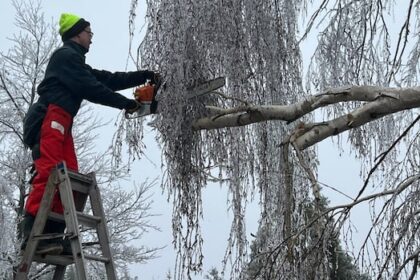ManitobaManitobans who have been waiting for more than a year and a half for visas to bring their family members in Gaza to safety say delays with Canada’s special measures program have left their loved ones in dire conditions as paperwork and unanswered questions continue to pile up. Winnipeggers with family trapped in central Gaza say biometrics requirements impossible to meet in warzoneLauren Scott · CBC News · Posted: Oct 20, 2025 7:00 AM EDT | Last Updated: 2 hours agoWinnipeg residents Waleed Jad, left, and Hafsaa Abuaassi, right, said they initially felt hopeful that Canada’s special measures program for Gazan refugees would help bring their loved ones to safety. After a year and a half of waiting in limbo, they feel Canada isn’t doing enough to help. (Tyson Koschik/CBC)Manitobans who have been waiting for nearly two years for visas to bring their family members in Gaza to safety say delays with Canada’s special measures program have left their loved ones in dire conditions as paperwork and unanswered questions continue to pile up. Winnipeg resident Hafsaa Abuaassi’s family has been trapped in the war zone since the fighting began more than two years ago. Her brother and brother-in-law were killed by Israeli airstrikes in December 2023, when they were travelling between two family homes in central Gaza to collect food. Her father survived the attack, but he has been waiting alongside Abuaassi’s mother and siblings for Canadian visas since the government introduced its special measures program in January 2024, which allows citizens or permanent residents to bring extended family members in Gaza to Canada under temporary resident visas. “I want to see my family here,” said Abuaassi, who moved to Canada in 2022. Earlier this month, Immigration, Refugees and Citizenship Canada (IRCC) told CBC it has brought 880 people to Canada through the program since July 29. Four hundred others have come to Canada under other programs, the department said. The special measures program for extended family members in Gaza is capped at 5,000 applications. That quota was reached in March and the IRCC’s website says all available spaces are filled. CBC Manitoba has reached out to the IRCC and Canada’s Immigration Minister Lena Metlege Diab’s office for comment, but did not hear back over the weekend. Sixteen of Abdalrahman Qeshta’s relatives are among the thousands waiting for their application to be processed. He grew up in Rafah in southern Gaza and moved to Canada in 2017. Most of his family was in Gaza on Oct. 7, 2023, when Hamas-led militants launched an attack on Israel that killed about 1,200 people and took 251 hostage. More than 67,000 Palestinians have been killed in Gaza over the past two years of Israel’s attacks. A United Nations Commission of Inquiry concluding last month that Israel has committed genocide in Gaza, citing the scale of the killings, aid blockages and forced displacement in its findings.In the two months following Oct. 7, Qeshta said his family endured “very hard times,” with family members getting sick from having nothing to drink but unclean water. “We love Gaza and we love our home … but we want to be in a safer place,” he said. Abdalrahman Qeshta, 40, says 16 of his family members are still waiting to hear whether they will be granted temporary resident visas nearly two years after the federal government introduced a special measures program for Gazan refugees. (Tyson Koschik/CBC)Qeshta’s family was able to cross the border into Egypt in early December 2023, he said. A month later, Canada introduced its special measures visa program. Despite applying right away, they’re all still waiting in Egypt nearly two years later — except for two brothers whose visas were approved last year. “We were trying to do our best for all of them to leave together,” he said. When the program opened in January, he went through a pre-application process to receive a code to apply for each family member. The code came in May and completed all of the applications with supporting documents throughout June and July. Over a year later, he says the application portal still says they are still processing under a security check. After countless calls with family members hoping for updates on their applications’ progress, he says he can offer few answers and worries the program was “designed to fail.””They gave promises to Canadians that they will bring their beloved family to be with them,” Qeshta said. He said two of his brothers received their temporary visas last year. One has already arrived. The other will land in Canada this week, he said. Biometrics impossible to get in Gaza: family memberLike Qeshta, Abuaassi’s loved ones have been stuck in the security screening phase for more than a year. Her husband Waleed Jad said they have contacted multiple Canadian officials about their applications, including Immigration, Refugees and Citizenship Canada, the Canadian embassy in Jordan, and their local member of parliament. But they’ve been receiving the same answer for months. “They basically said that we can’t get anyone out of Gaza because they don’t have biometrics done. They can’t do biometrics in Gaza because there’s no [biometrics] office in Gaza,” Jad said, frustrated that officials continue “circling the same problem” without helping refugees to meet the requirement. The neighbourhood where Hafsaa Abuaassi’s family lives in central Gaza is shown in a September 2025 photo taken by her sister. (Submitted by Hafsaa Abuaassi)He said there are biometrics offices across the borders in Jordan, Egypt and Tel Aviv, but these offices are largely inaccessible because some borders have been closed while others require steep fees to cross — some as high as $10,000 US ($14,000 Cdn) per person. Qeshta says his family was able to complete their biometrics requirements, which include capturing fingerprints and a photo, in Egypt. Abuaassi’s family home has been reduced to “open shelter” with no windows or doors anymore, said Jad, who is also from central Gaza but much of his family now lives in Canada. About 83 per cent of all structures in Gaza have been damaged, according to United Nations satellite estimates late last month. The neighbourhood where Hafsaa Abuaassi’s family lives in central Gaza is shown in a September 2025 photo taken by her sister. (Submitted by Hafsaa Abuaassi)”The situation there is unbearable,” he said, stressing that food, water and medical care remain scarce despite the promise that aid would start flowing into the region under the current ceasefire deal. On Sunday, Israel launched airstrikes and artillery fire in southern Gaza, killing at least eight Palestinians, the Gaza health authorities said. Israel said the Rafah border crossing between Gaza and Egypt, where trucks with humanitarian aid had been crossing, will remain closed until further notice.Jad said Canada must act now to clear the bureaucratic backlog and bring Gazans to safety, suggesting the federal government could waive some biometrics requirements — as Canada had previously done for some Ukrainian refugees fleeing war. “It should be faster, given the situation, the harsh conditions that they are living in,” Jad said. “Hope is not enough by itself, Canada has to do some actions,” he said. ABOUT THE AUTHORLauren Scott is a Winnipeg-based reporter with CBC Manitoba. They hold a master’s degree in computational and data journalism, and have previously worked for the Hamilton Spectator and The Canadian Press.With files from Rosanna Hempel
Wednesday, 4 Feb 2026
Canada – The Illusion
Search
Have an existing account?
Sign In
© 2022 Foxiz News Network. Ruby Design Company. All Rights Reserved.
You May also Like
- More News:
- history
- Standing Bear Network
- John Gonzalez
- ᐊᔭᐦᑊ ayahp — It happened
- Creation
- Beneath the Water
- Olympic gold medal
- Jim Thorpe
- type O blood
- the bringer of life
- Raven
- Wás’agi
- NoiseCat
- 'Sugarcane'
- The rivers still sing
- ᑲᓂᐸᐏᐟ ᒪᐢᑿ
- ᐅᑳᐤ okâw — We remember
- ᐊᓂᓈᐯᐃᐧᐣ aninâpêwin — Truth
- This is what it means to be human.
- Nokoma











